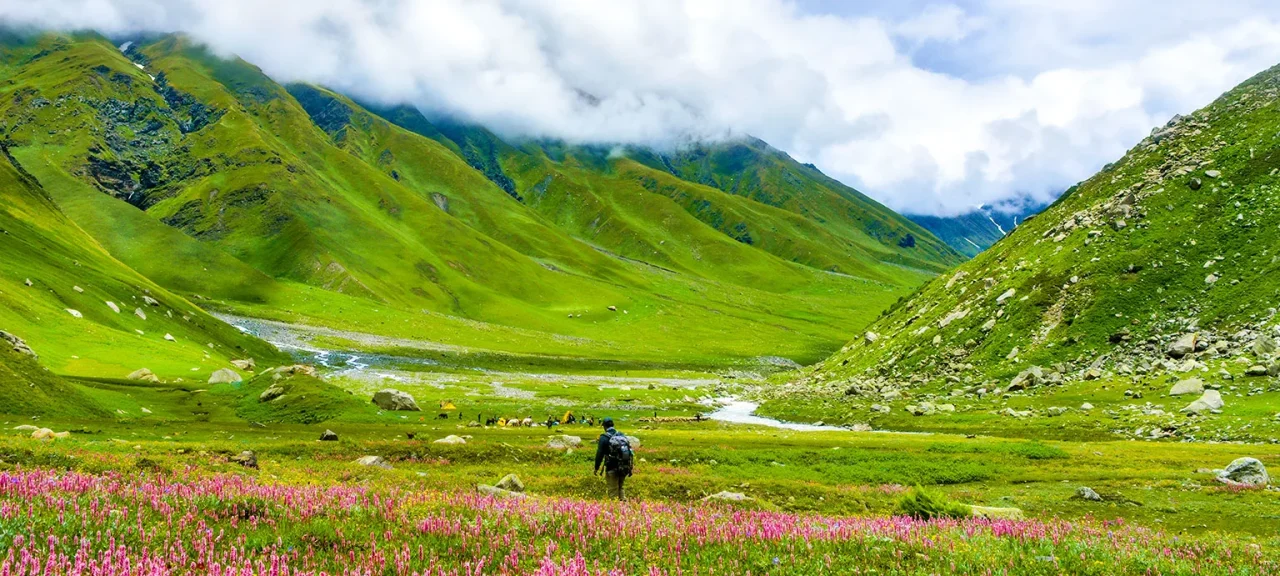Day 1: Shimla to Kafnu
The trek begins with an early pickup from the Old Shimla Bus Stand at 6:30 am. The 200 km drive to Kafnu takes 7 to 8 hours, passing through picturesque landscapes of the Sutlej River, Kinnaur Ranges, and Bhabha Valley. The route includes India’s first underground hydroelectric project on the Bhabha River. On arrival in Kafnu, a peaceful village surrounded by apple orchards and the Sutlej River, trekkers enjoy dinner and rest in a guesthouse while preparing for the trek ahead.
Day 2: Kafnu to Mulling
The trek begins with a gradual ascent before transitioning to a more challenging climb. Covering approximately 11 km in 7 to 8 hours, the trail passes the Bhabha Hydro Project, silver birch, pine, and oak forests, and a bridge over the Bhabha River. After a scenic journey through the Champoria campsite and Jhandi Top, the final stretch leads to the serene Mulling campsite. The site, set near a river, offers natural water sources, and trekkers enjoy a packed lunch before settling into twin-sharing tents for the evening.
Day 3: Mulling to Kara
This relatively easier day covers 6 km in 4 to 5 hours. The trail consists of rocky terrain with a steep ascent in the final kilometer. Trekkers cross streams, hidden boulders, and a waterfall before reaching Kara, a stunning campsite near a tranquil lake. The journey is adorned with vibrant flowers, meadows, and grazing animals. After a hot lunch at the campsite, participants can relax and soak in the breathtaking surroundings before spending the night in tents.
Day 4: Kara to Phutsirang
The trek to Phutsirang spans 5 km over 4 to 5 hours with a continuous ascent. The route includes multiple river crossings, such as the Bhabha River, and a mix of boulders and streams. Trekkers enjoy views of the Hansbeshan Peak, Nimish Khango, Tari Khango, and glimpses of the Pin Bhaba Pass. Depending on snow conditions, the group camps at either the lower or upper Phutsirang site. A hot lunch is served, and the night is spent in tents surrounded by magnificent mountain views.
Day 5: Phutsirang to Mangrungse via Pin Bhaba Pass
The most challenging day of the trek covers 12 km in 10 to 12 hours. Starting early at 2 to 3 am, the trail involves a steep ascent to Pin Bhaba Pass, where trekkers are rewarded with contrasting views of the lush Bhabha Valley and the stark, cold desert of Pin Valley. Limited water sources and a dramatic change in landscape add to the challenge. After crossing the pass, a steep descent leads to Mangrungse, a vibrant campsite surrounded by colorful mountains. A packed lunch is provided before settling in for the night.
Day 6: Mangrungse to Mudh/Kaza
The penultimate day involves a 17 km trek, taking 7 to 8 hours to reach Mudh, the last village in Spiti Valley. The trail descends gradually, passing Bara Boulder campsite, a wooden bridge, and the red soil landscapes of Pharka village and the Pin River. Upon reaching Mudh, participants drive to Kaza, the commercial hub of Spiti Valley. A packed lunch is provided, and accommodation is arranged in a guesthouse in Mudh or Kaza.
Day 7: Acclimatization/Rest Day
This optional day in Kaza allows participants to acclimatize to the high altitude and explore the local monasteries, markets, and cultural sights of Spiti Valley. It is a perfect opportunity to relax and soak in the unique atmosphere of the region.
Day 8: Kaza to Manali
The trek concludes with a long 200 km drive to Manali, taking approximately 9 to 10 hours via Rohtang Pass. Participants enjoy breakfast and lunch on the way (not included) and arrive in Manali between 6:00 and 7:00 pm. This marks the end of an unforgettable adventure through the contrasting valleys and landscapes of Himachal Pradesh.


